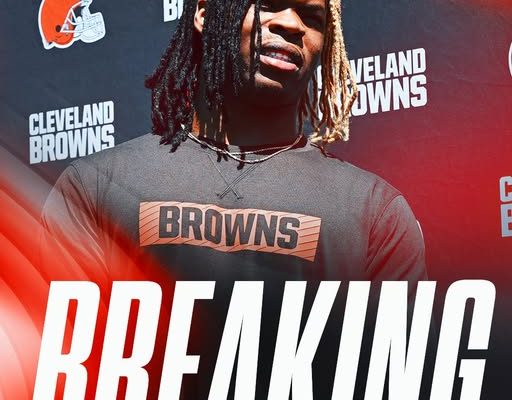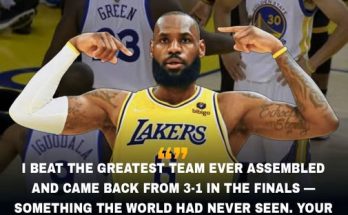Quinshon Judkins, the talented running back drafted by the Cleveland Browns in the 2025 NFL Draft, has recently found himself at the center of off-field controversy. In July, Judkins was arrested in Florida amid allegations of domestic violence and battery, sparking immediate attention from fans, media, and league officials. For a player whose on-field potential was widely celebrated, the arrest represented a significant and potentially career-altering setback. However, in a turn of events that has relieved both the player and his supporters, prosecutors in Florida have declined to pursue formal charges against Judkins. This decision effectively clears the running back of any legal culpability related to the allegations, though it leaves him as the only unsigned pick from the 2025 NFL Draft, keeping his professional future in a state of uncertainty.
The news that Judkins will not face formal charges comes after a period of intense scrutiny. Florida authorities reviewed the case thoroughly, examining evidence and witness statements, before ultimately determining that there was insufficient basis to proceed with prosecution. While the details of the investigation have not been fully disclosed, multiple reports indicate that prosecutors found the claims did not meet the threshold required for a criminal case. This decision underscores a critical aspect of the legal system: allegations alone do not automatically translate into convictions or charges. For Judkins, this outcome represents a significant personal and professional relief, allowing him to refocus on his career and the path ahead in the NFL.
Judkins’ situation has also highlighted the intersection between legal matters and professional sports. In recent years, the NFL has faced increasing scrutiny over how it handles players accused of off-field misconduct. The league has implemented strict policies regarding personal conduct, often leading to suspensions, fines, or other disciplinary actions even in the absence of formal charges. This approach aims to maintain the league’s public image and protect its players and fans. For Judkins, while the decision not to press charges removes legal consequences, it does not automatically guarantee a clear path to joining the Browns’ roster. The team’s management will weigh not only his athletic potential but also any reputational considerations when determining next steps.
As the only unsigned draft pick from the 2025 class, Judkins finds himself in a unique and challenging position. Teams often expect their rookies to integrate quickly into professional systems, participating in training camps, preseason games, and other organized activities. Being unsigned can disrupt this process, limiting access to coaching, team facilities, and structured development. For a player with Judkins’ talent, time away from formal team activities could impact his preparedness for the season. Yet, it is not uncommon for unsigned rookies to eventually join NFL teams after resolving off-field issues or negotiating contract terms. In Judkins’ case, clearing legal hurdles may serve as a pivotal factor in facilitating his entry into the league.
The attention surrounding Judkins also reflects the broader culture of media scrutiny in professional sports. High-profile athletes are often under the microscope, with every action—both on and off the field—subject to public evaluation. Social media, sports news outlets, and fan forums amplify these narratives, sometimes creating pressure that can influence a player’s career trajectory. For Judkins, the arrest and subsequent legal review drew significant coverage, placing him in the spotlight in a way that few rookies experience. The eventual decision not to pursue charges may help recalibrate public perception, but the initial headlines likely left an indelible mark on his early professional image.
Beyond media and legal implications, the situation raises important questions about the responsibilities of athletes as public figures. NFL players, particularly those entering the league with high expectations, often become role models and representatives for their communities. Allegations of misconduct, regardless of their eventual legal outcome, can shape public opinion and affect relationships with sponsors, teammates, and fans. Judkins now faces the task of rebuilding his professional image, demonstrating his commitment to personal growth and responsibility, while simultaneously proving himself on the field. How he navigates this period will be crucial not only for his career but also for his long-term standing within the league.
The Cleveland Browns, as Judkins’ drafting team, have a complex role in this scenario. Teams must balance the potential athletic contributions of a player with considerations of character, public relations, and internal culture. Judkins’ draft status indicates that the Browns saw significant promise in his abilities, suggesting that on-field performance could outweigh past controversy if managed appropriately. However, teams also consider fan sentiment, organizational values, and the example set for other players. In this context, the decision to delay or withhold signing Judkins may reflect a cautious approach, ensuring that all off-field matters are fully understood and resolved before committing to a contract.
From a broader perspective, Judkins’ case is emblematic of the challenges faced by young athletes transitioning to professional sports. The NFL Draft represents the culmination of years of dedication, skill development, and competition, and being selected is a milestone achievement. Yet, off-field issues, whether legal, personal, or behavioral, can quickly complicate this transition. For Judkins, the arrest in July was a stark reminder that success in professional sports is measured not solely by talent but by a combination of performance, conduct, and reputation. Navigating these challenges requires maturity, resilience, and support from advisors, mentors, and family.
Financial implications are also a significant consideration for unsigned draft picks. NFL contracts often include signing bonuses, guaranteed money, and performance-based incentives, all of which hinge on being officially signed to a team roster. By remaining unsigned, Judkins temporarily forgoes these financial benefits, creating additional pressure to resolve outstanding matters swiftly. The league’s structure allows for some flexibility, but delays can limit earning potential and affect long-term financial security. Clearing the legal hurdle is a critical step in enabling Judkins to pursue these professional and financial opportunities without further complications.
In addition, Judkins’ situation invites examination of the NFL’s support systems for players facing legal or personal challenges. The league, in partnership with the NFL Players Association, provides resources such as counseling, mentorship programs, and education on personal conduct. These resources are designed to help players navigate off-field issues while maintaining focus on their athletic development. For Judkins, accessing such support could be instrumental in preparing for his eventual signing and ensuring that he integrates successfully into a team environment. Leveraging these programs can also signal to teams and fans that he is committed to personal accountability and growth.
Fan reaction to the news has been varied, reflecting the complexities of public perception. Some supporters celebrate the outcome as a vindication for Judkins, emphasizing the importance of presumption of innocence and recognizing the pressures young athletes face. Others remain cautious, viewing the episode as a cautionary tale about the scrutiny that accompanies professional sports careers. Social media platforms, forums, and fan discussions have amplified these perspectives, demonstrating the interplay between legal developments, media coverage, and public sentiment. How Judkins engages with this discourse, and the steps he takes to rebuild his public image, will influence both fan support and his professional trajectory.
Looking ahead, the path for Judkins involves a combination of strategic decision-making, athletic preparation, and personal growth. Signing with the Browns, when the time comes, will mark the next major milestone in his career, allowing him to participate in training, build rapport with teammates, and prove himself on the field. Equally important will be his conduct off the field, as maintaining a positive personal and professional reputation is essential for long-term success in the league. Judkins’ ability to navigate these dual responsibilities—excelling athletically while demonstrating maturity and accountability—will likely define his career trajectory in the NFL.
In conclusion, the news that Quinshon Judkins will not face formal charges in Florida represents a significant turning point for the young running back. The legal resolution removes a major obstacle, yet leaves him as the only unsigned draft pick from the 2025 class, highlighting ongoing uncertainties in his professional journey. Judkins now faces the challenge of proving himself to the Cleveland Browns, rebuilding his public image, and preparing for the rigorous demands of the NFL. His case underscores the complex interplay of talent, conduct, legal scrutiny, and public perception that defines modern professional sports. As Judkins works toward securing his place in the league, his journey serves as a reminder of both the opportunities and challenges that young athletes encounter as they transition from collegiate stardom to the professional stage, demonstrating that success in the NFL requires not only exceptional athletic ability but also resilience, accountability, and strategic navigation of off-field challenges.
This period is pivotal for Judkins, and how he responds will shape not only the beginning of his career but also his long-term legacy in the NFL. Fans, analysts, and team officials will be watching closely, evaluating both his on-field performance and his capacity to learn from recent experiences. Ultimately, Judkins’ story highlights the delicate balance between potential and responsibility, offering insight into the realities of professional sports and the multifaceted challenges faced by players entering the NFL. His next steps will be crucial in determining whether he fulfills the promise that led the Browns to draft him, and whether he can turn a moment of controversy into an opportunity for growth and success at the highest level of football.



